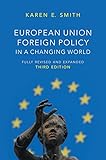European Union foreign policy in a changing world / Karen E. Smith
Material type: TextLanguage: English Cambridge, UK ; Malden, MA : Polity Press, 2014©2014 Edition: Fully revised and expanded third editionDescription: xiii, 292 pages : illustrations ; 25 cmContent type: text Media type: unmediated Carrier type: volumeISBN: 0745664695 (hardback)Subject(s): Human rights -- European Union countries | Democracy -- European Union countries | Conflict management -- European Union countries -- International cooperation | Crime prevention -- International cooperation | European Union countries -- Foreign relationsLOC classification: D1060 .S65 2014
TextLanguage: English Cambridge, UK ; Malden, MA : Polity Press, 2014©2014 Edition: Fully revised and expanded third editionDescription: xiii, 292 pages : illustrations ; 25 cmContent type: text Media type: unmediated Carrier type: volumeISBN: 0745664695 (hardback)Subject(s): Human rights -- European Union countries | Democracy -- European Union countries | Conflict management -- European Union countries -- International cooperation | Crime prevention -- International cooperation | European Union countries -- Foreign relationsLOC classification: D1060 .S65 2014| Item type | Current library | Shelving location | Call number | Copy number | Status | Date due | Barcode |
|---|---|---|---|---|---|---|---|
| Books | MEF Üniversitesi Kütüphanesi | Genel Koleksiyon | D 1060 .S65 2014 (Browse shelf (Opens below)) | Available | 0011753 |
Browsing MEF Üniversitesi Kütüphanesi shelves, Shelving location: Genel Koleksiyon Close shelf browser (Hides shelf browser)
| No cover image available |

|
No cover image available |

|

|
No cover image available |

|
||
| D 975 .O785 2024 Gel dünyayı keşfedelim : gezgin bir tarihçinin seyahat defteri / | D 1056.2 .T87 K85 2015 Avrupa(lılık) nedir? : Türkiye ne kadar Avrupalıdır? / | D 1058 .P6819 1981 Portekiz İspanya ve Yunanistan'da geçiş süreci / | D 1060 .S65 2014 European Union foreign policy in a changing world / | D 1065 .R9 A83 2019 Rusya'nın Avrupa siyaseti / | D 9502 .T92 A48 2023 Alternatif enerji kaynakları ve doğal gaz lojistiği raporu / | DA 47.9 .T8 B4719 2016 İngiliz gizli belgelerinde "Yahudi dönmesi ittihatçılar" : Gerald H. Fitzmaurice : Türkiye'deki İngiliz Büyükelçiliği Baştercümanı'nın anıları / |
First edition: 2003
Includes bibliographical references (pages 262-282) and index.
Introduction : conceptualizing EU foreign policy -- The evolution of the EU as an international actor -- The EU's foreign-policy instruments -- Regional cooperation -- Human rights -- Democracy and good governance -- Conflict prevention -- The fight against international crime -- Conclusion -- Appendix : negative measures imposed by the EU for violations of human rights and democratic principles 1988-2013
The European Union finds itself at a critical juncture; not only has the deepening crisis in the eurozone weakened the EU s internal structure, it has impacted significantly on its international image and external relations. The third edition of European Union Foreign Policy in a Changing World offers a clear and detailed analysis of the complexities and challenges of contemporary European foreign policy-making. Thoroughly revised and expanded, the book explores how and why the EU endeavours to achieve five core foreign policy objectives: * The encouragement of regional cooperation * The advancement of human rights * The promotion of democracy and good governance * The prevention of violent conflicts * The fight against international crime, including terrorism The book shows how the EU must grapple with acute policy dilemmas because the five objectives not only clash with each other, but also with other policy priorities. The Lisbon Treaty may have resolved some of the difficulties of making sound EU foreign policy but, the book contends, coherence remains an ongoing problem. It also explores the challenges the EU faces in achieving its objectives in a multipolar world, against the backdrop of a euro crisis which has damaged the EU s international standing and drained attention and resources away from foreign policy-making. This accessible and thoroughly researched book will be a valuable resource for undergraduate and postgraduate students of European politics, foreign policy analysis, international relations and related disciplines.
